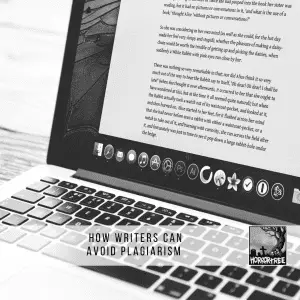How Writers Can Avoid Plagiarism
How Writers Can Avoid Plagiarism
 While we all care about our talent as writers, the idea of intentional or accidental plagiarism is always present in the dark corners of our minds. It is important that every sentence you write is your own and that you never borrow from another writer.
While we all care about our talent as writers, the idea of intentional or accidental plagiarism is always present in the dark corners of our minds. It is important that every sentence you write is your own and that you never borrow from another writer.
Every once in a while, it is a good idea to be reminded of the importance of avoiding plagiarism while also being refreshed about how to properly cite your sources. Today, we will tell you how to do so while also managing your writing time to avoid accidents that could put your career in jeopardy.
Technical Tips for Avoiding Plagiarism
If you are new to the writing scene, then you need to know how to properly cite your sources so that you can never be accused of plagiarism or stealing the ideas of a fellow writer. As you write, it is a wise idea to have a separate document where you keep track of the sources you reviewed to create your prose.
It is especially important that you write down the sources you used if you take a direct quote or if you closely paraphrase what you read and use it in your piece. As an added measure, once you are done with your first draft, consider running it through a plagiarism checker such as Grammarly or ProWritingAid. (Note: The previous two links are affiliate links which gives us a small portion of the sale without adding anything to your cost.)
Once your work is complete, you need to cite your sources. You can either do that with an in-text comment or you can add a section at the end where you list all of your sources. Don’t take any chances. When in doubt, add your source. It is better to have extra information listed now than to be accused of plagiarism and have to prove your innocence later.
Burnout and Accidental Plagiarism
Even if you know how to avoid plagiarism, it is still possible that you could make a mistake, especially if you are overworked. If you write a lot every day or you multitask with multiple jobs, and you don’t take the appropriate breaks, then you could quickly experience burnout. The symptoms of burnout include mental issues, such as a loss of concentration or drop in productivity, and it can also manifest itself physically through a loss of sleep and headaches.
Burnout can occur when you write for yourself, or you write for a corporation. For example, many project managers can be so focused on completing the project to perfection that they stop socializing with others, become physically ill, and even have a negative perception of the job.
The point is that if you are not enjoying the work and you are under incredible pressure to get it done, then it may be more tempting to want to just steal some ideas from someone else so you can eliminate the stress. But you must avoid these temptations. Failure to do so could put your job or your future at risk.
Reset Your Mind
If you are experiencing burnout or you are flirting with the idea of plagiarizing, then you may need to take a step back and refresh your mind. Get up from the computer and take a walk or spend a few days on something else and then come back when you are feeling better.
Then, take it one step at a time. Cut back on the number of words you are writing every day, and don’t go past that threshold. Stop writing at the same time every day, leave your desk, and do something you enjoy or move on to another task.
It is also a good idea to complete your writing work in steps. First, write your first draft and notate all of your sources. Then, step away for a day. When you return, you will have a fresh mind. Read your draft again and ensure that all quotes have quotation marks and that every unquoted word is your own.
In the end, while you may typically be extra vigilant about avoiding plagiarism, it is important that you keep yourself in check, so you never steal what isn’t yours. Consider these tips, and you can make your job easier and submit your work with confidence.
- About the Author
- Latest Posts












